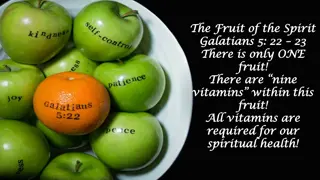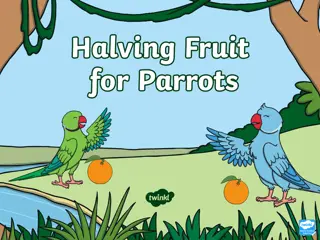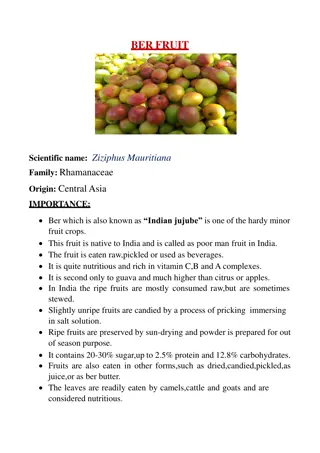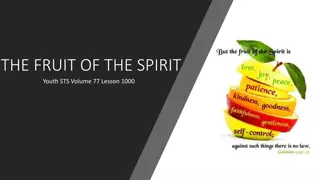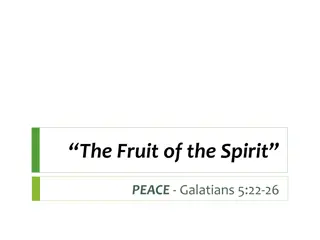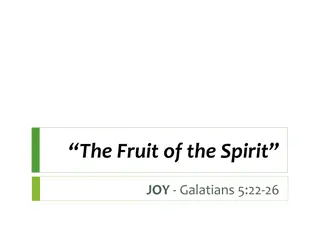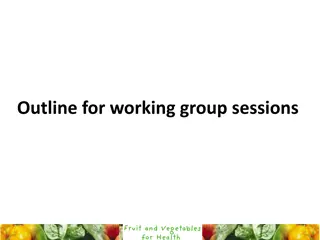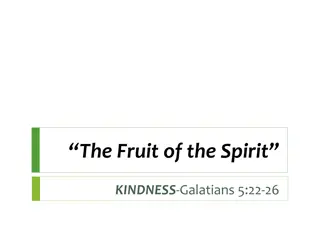Joy is the second fruit of the Spirit mentioned in Galatians
The fruit of the Spirit, particularly joy, is discussed in Galatians 5:22 as a product of an obedient life. Rejoicing in the Old and New Testaments is linked to various celebrations and expressions of gratitude towards God. Joy in Christian life is more than just happiness, as it transcends personal experiences and emotions, rooted in a deep spiritual connection. This profound understanding of joy is essential for believers to cultivate in their walk with God.
Download Presentation

Please find below an Image/Link to download the presentation.
The content on the website is provided AS IS for your information and personal use only. It may not be sold, licensed, or shared on other websites without obtaining consent from the author.If you encounter any issues during the download, it is possible that the publisher has removed the file from their server.
You are allowed to download the files provided on this website for personal or commercial use, subject to the condition that they are used lawfully. All files are the property of their respective owners.
The content on the website is provided AS IS for your information and personal use only. It may not be sold, licensed, or shared on other websites without obtaining consent from the author.
E N D
Presentation Transcript
Joy is the second fruit of the Spirit mentioned in Galatians 5:22. The fruit of the Spirit is not something that believers can manufacture. The fruit of the Spirit is the product of an obedient life. As we walk in daily obedience to God s Word, the Holy Spirit produces His fruits in and through our lives. This must be understood with regard to all the fruits of the Spirit.
In the OT rejoicing is frequently expressed in connection with the feasts; in fact, they are called times of rejoicing (Num 10:10). Joyous celebration took place when recalling God s marvelous act of delivering Israel from bondage, the Feasts of Passover and Unleavened Bread (2 Chr 30:21 27; Ezra 6:22; cf. also Psalms 95 and 98). The Feasts of Pentecost and Tabernacles (Deut 16:11, 14, 15; Lev 23:40). The Feast of Purim (Esth 8:17). God s help in battle (2 Chr 20:27; Ps 9:2; 13:3; 21:1; 109:28). God s protection (Ps 16:9). God s presence (Ps 16:11). Hope for the future (Isa 44:23; 65:14 19; cf. also Zeph 3:14 17; Zech 2:10). Knowing the righteous will ultimately experience everlasting joy (Isa 51:11). Not only do God s people rejoice, but God himself is represented as rejoicing in his works (Ps 104:31) and in his people (Deut 30:9; Pss 147:11; 149:4; Zeph 3:17).
Mentioned over 55 times in the N.T. Matt. 2:10, Matt. 13:20, 44, Matt. 25:21, 23, Matt. 28:8, Luke 1:14, Luke 1:44, Luke 2:10, Luke 6:23, Luke 8:13, Luke 10:17, Luke 15:7, 10, Luke 24:41, 52, John 3:29, John 15:11, John 16:20, 21, 22, 24, John 17:3, Acts 2:28, Acts 8:8, Acts 13:52, Acts 15:3, Acts 20:24, Rom. 14:17, Rom. 15:13, 32, 2 Cor. 1:24, 2 Cor. 2:3, 2 Cor. 7:13, 2 Cor. 8:2, Gal. 5:22, Phil. 1:4, 25, Phil. 2:2, Phil. 4:1, 1 Thes. 1:6, 1 Thes. 2:19, 20, 1 Thes. 3:9, 2 Tim. 1:4, Philem. 7, Philem. 20, Heb. 12:2, Heb. 13:17, Jas. 1:2, Jas. 4:9, 1 Pet. 1:8, 1 Pet. 4:13, 1 John 1:4, 2 John 12, 3 John 4, Jude 24
In both the Hebrew O.T. and the Greek N.T. there are at least fifteen different words used to express the concept of joy. With such an array of words used it is not surprising that joy is to be an integral part of one s Christian walk and life. Closely related to gladness and happiness. Joy is more a state of being than an emotion; a result of choice. One of the fruits of the spirit (Gal 5:22 23). Delight, joy, gladness, exultation, especially with song and dance (Sorry Baptists!), merriment.
Personal happiness is always connected to experience. Good days make us happy and bad days make us sad. Happiness defines the mood of the moment. It is pure emotion. Joy is very different. It is not connected to personal experience. It is not based on our personal emotions. If it were then God s Word would not make sense.
After the apostles were threatened and flogged by the Sanhedrin; they went their way rejoicing that they had been considered worthy to suffer shame for His name. (Acts 5:41) In Acts 13 Paul and Barnabus were persecuted and driven out from Pisidian Antioch. In response to this the disciples were continually filled with joy and with the Holy Spirit. (Acts 13:51-52) Paul made the following statement: You also became imitators of us and of the Lord, having received the word in much tribulation with the joy of the Holy Spirit, so that you became an example to all the believers in Macedonia and in Achaia. (I Thessalonians 1:6-7) Consider it all joy, my brothers, when you encounter various trials, knowing that the testing of your faith produces endurance. (James 1:2-3) In this you greatly rejoice, even though now for a little while, if necessary, you have been distressed by various trials, so that the proof of your faith, being more precious than gold which is perishable, even though tested by fire, may be found to result in praise and glory and honor at the revelation of Jesus Christ; and though you have not seen Him, you love Him, and though you do not see Him now, but believe in Him, you greatly rejoice with joy inexpressible and full of glory, (I Peter 1:6-8)
The Mark Carpenter long and short definition of joy: Joy is a state of mind. It is living with an inner satisfaction that comes from knowing that your life is not only secure in Christ, but that your life brings honor to Him. It is the contentment that comes from knowing that Jesus loves you and you love Him. It is the esteem that comes from developing fellowship with fellow believers. It is the confidence that comes when you walk in daily obedience to His Word. Joy is the satisfaction, contentment, and confidence that comes from knowing you bring honor to Jesus through personal obedience and that your life matters to God. This is why hardship does not affect it.
When hardships and trials come the Bible encourages and commands us to respond with Joy. According to the Bible, joy is a product of hardship and trial. In I John chapter one we read that our joy may be made complete only after we enter into fellowship with Jesus and with other believers. In Romans 15:13 Paul asks that the God of hope fill you with all joy and peace in believing, so that you will abound in hope by the power of the Holy Spirit. He wrote this after encouraging fellow believers to put the needs of others before themselves. In John 15, Jesus is speaking to His disciples. Eight times He tells the disciples to abide in Him. The word abide means to dwell and take residence in. Jesus says that if we abide in His love we will be filled with joy. The way we prove we are abiding in Jesus love is by keeping His commandments. When we put these thoughts together what do we see? Joy comes from the Lord. It develops and grows as we Grow in our knowledge of Him, Develop relationships with fellow believers, Pour our lives into other people, Walk in daily obedience to His Word.
You must make sure you belong to Jesus. Walk in daily obedience to His Word. Develop relationships with fellow believers. Pour your life into other people. Abide in His love. Remind yourself daily of how much He loves you. Never let any situation or experience shake your confidence in His love. Do these things and the Holy Spirit will fill you with the joy of the Lord. That is a promise!
God will often take you through rough waters. He will often lead you through difficult situations. That is the path. The end result is always a deeper relationship with Him. That is the product. To walk with joy you must focus on the product of obedience, and not the path of obedience. When you walk with Jesus and pour your life into others you will impact a lot of lives. However, you will also offend a lot of people. There are a lot of people who want nothing to do with Jesus. They want nothing to do with followers of Jesus. So, when you reach out to them they will attack you. To walk with joy you must focus on the people you impact, and not the people who attack you. Life is a steady stream of crises. The moment one abates, another develops. They never go away. However, life is also a steady stream of blessings. Nevertheless, life is hard. This is why Paul tells us in Colossians to set our minds on the things above and not on the things of the earth. No matter how hard life is, there will be a day for the believer when God will wipe away all tears, and there will be no more sickness, or pain, or death. Life is short. Eternity is not. To walk with joy one must focus on future glory and not present circumstances.
Focus on the product of obedience, and not the path of obedience. Focus on the people you impact, and not the people who attack you. Focus on future glory and not present circumstances.




